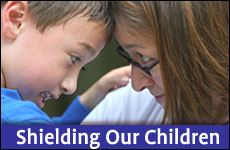 We Were the Lucky Ones
We Were the Lucky Ones


5 min read
Are we helping our children by protecting them from all of life's difficulties?
There is nothing parents want to do more than protect their children from all of life's literal and figurative bumps. From their first boo-boo to their first poor grade. (What? My child?) From their first heartache to their first unpleasant boss.
And there is nothing we are less capable of. Despite all our efforts, our anxieties, and our sleepless nights, the Almighty still runs the world and our children still have free will. (Even though some parents do their best to destroy it.)
But is it appropriate to try? Are we helping our children by rescuing or sheltering them from life's difficulties? Are we assisting them along their journey to self-reliance and self-sufficiency or are we perhaps hindering their growth? Infantilizing? Overprotecting and perhaps damaging their sense of self in the process?
Leaving aside the generally accepted physical dangers -- no dark alleys, candy from strangers or cell phones while driving -- what exactly is our responsibility?
Many educators and psychologists -- Wendy Mogel, author of "The Blessing of a Skinned Knee," being among the most prominent -- are encouraging parents to step back. Their over involvement is counterproductive, she claims. The Wall Street Journal abounds with stories of parents filling out college applications, going along on interviews and even post-college calling their children's bosses about raises and promotions. And then they wonder why their children move back home.
Starting with the Talmudic dictum to teach our children to swim, the Torah supports independence and greater degrees of mature and "adult" behavior.
And this training needs to start young. From very small infants, our children pick up their clues from our behavior. If they fall and scrape themselves and we react like it's a major trauma, so will they. If we treat it matter-of-factly, so will they. They will learn that falls and scratches and cuts and bruises are a part of life, to be accepted with minimal complaint. And even more importantly, they will learn that these ‘injuries' are a small price to pay to learn a new skill or participate in a group game.
Part of maturing is learning to cope with adversity.
As our children get older, this concept needs to transfer to school. Certainly it is our responsibility as parents to make sure that our children get a quality education, both in academics and in character. We need to choose a school carefully and possibility step in on rare occasions. But in general we need to pull back and let our (precious) child learn by experience. Even in the ‘best' schools, there are imperfect teachers. While we would certainly prefer that every educator be warm and understanding and loving -- and appreciate exactly who our child is and what he/she needs (as would the parents of the 24 other kids in the class) -- this is not realistic. There will be boring teachers, impatient teachers, cold teachers.
Part of maturing is learning to cope with adversity. Part of growing is making the best of a bad situation. We need to teach our children not to complain and give them tools to deal with a less-than-perfect educational environment.
My friend Shelly had a daughter who always seems to have difficult teachers (Was it the teachers or the daughter? It's certainly easier to blame the school!) Every few months, Shelly was at the school, arguing with the administration. Although her daughter appreciated the support, it eventually became negative. Her daughter gave up homework or paying attention in class after realizing that an aggressive phone call from her mother got the same results with significantly less effort. Although she squeaked through high school this way, she is now floundering in college where she lacks disciplined study skills -- or any real sense of responsibility -- and where the professors are immune to her mother's pleadings.
We try to protect our kids in friendships as well. Although there is occasionally a troubled school bully or a class with some serious problems, most are minor disagreements and are better solved by the children themselves. Throughout our lives we need to work out misunderstandings in relationships -- in marriages, family, friendships and at work. School does more than develop our math and reading abilities. On the playground, our children learn life skills as well. If their parents -- or teachers or school psychologists -- get involved in every fight, how will this child learn to work things through with a difficult colleague or even with a spouse?
It's painful when our children are unhappy. We want to fix it. But we need to stop ourselves. First of all, even though it seems like such a crisis in the moment, they will recover rapidly. (It usually takes the parents a little longer.) Second of all, they learn a lot more by working it out themselves. Sometimes I overhear snatches of phone conversations (what me, eavesdrop?) and I know that one of my daughters is involved in another one of those scenes. But I usually find that if I keep my mouth shut (she didn't ask for my help or opinion anyway), two days later they're "best friends" again. And she's developed great negotiating skills along the way.
Fear traps all of us. We don't want our children to be fearful and neurotic. We want them to appreciate that the Almighty is always looking out for them and that living a meaningful and rich life involves taking risks and interacting with others in our imperfect world. All successful people -- whether in business, in relationships, in their spiritual lives -- have had to take risks, to fall and get up again. And again.
We can't shield our children. It's a painful and humbling recognition. The real question is: Do we really want to?
